lights CADILLAC CATERA 1997 1.G Owners Manual
[x] Cancel search | Manufacturer: CADILLAC, Model Year: 1997, Model line: CATERA, Model: CADILLAC CATERA 1997 1.GPages: 338, PDF Size: 18.02 MB
Page 8 of 338
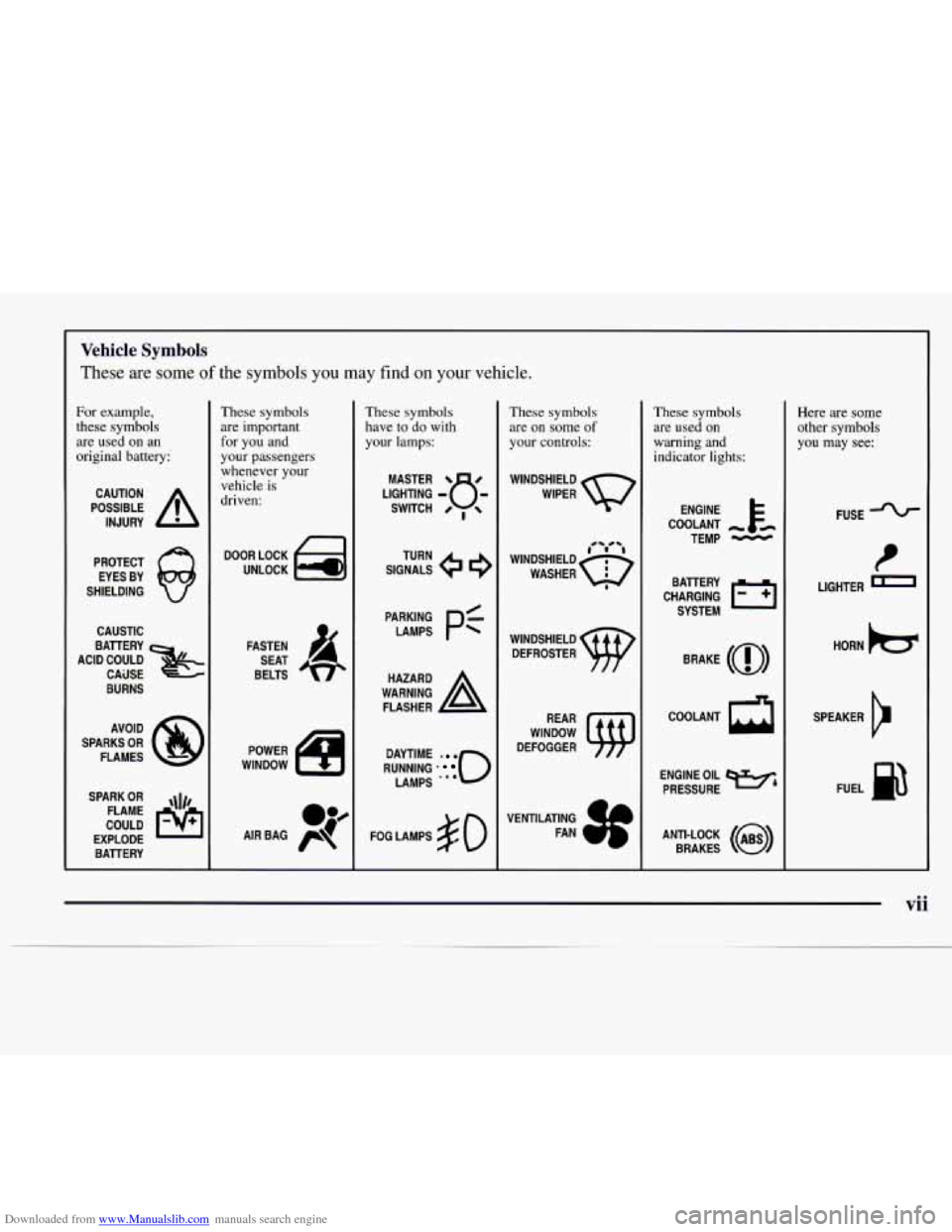
Downloaded from www.Manualslib.com manuals search engine Vehicle Symbols
These are some of the symbols you may find on your vehicle.
For example,
these symbols
are used on an
original battery:
POSSIBLE A
CAUTION
INJURY
PROTECT EYES
BY
SHIELDING Q
CAUSTIC
BURNS AVOID
SPARKS
OR
FLAMES
SPARK
OR ,\I/,
COULD FLAME
EXPLODE BATTERY
These symbols are important
for you and
your passengers
whenever your
vehicle
is
driven:
DOOR LOCK
UNLOCK
FASTEN SEAT
BELTS
POWER
WINDOW
These symbols have
to do with
your lamps:
SIGNALS e 9
TURN
WARNING
A
HAZARD
FLASHER
RUNNING * 0
DAYTIME - 0
LAMPS '**
FOG LAMPS $0
These symbols
are on some
of
your controls:
WINDSHIELD
WIPER
WINDSHIELD DEFROSTER
WINDOW
DEFOGGER
VENTILATING FAN
These symbols are used on
warning and
indicator lights:
COOLANT -
TEMP -
CHARGING 1-1
BATTERY
SYSTEM
BRAKE
(a)
R
ENGINE OIL
PRESSURE
Wb
ANTI-LOCK (@)
BRAKES
Here are some other symbols
you may see:
FUSE
LIGHTER
m
HORN )tr
SPEAKER
b
FUEL B
vii
Page 62 of 338
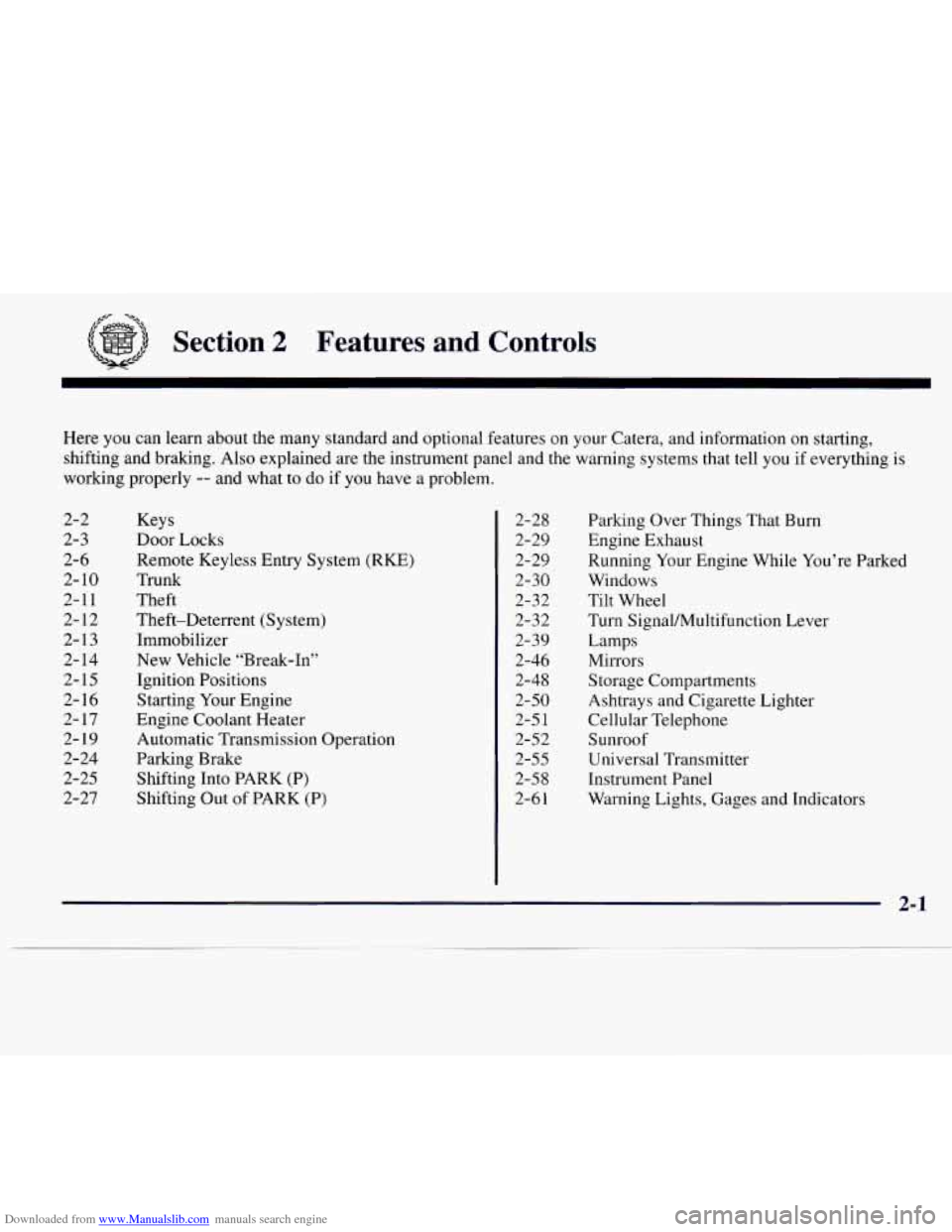
Downloaded from www.Manualslib.com manuals search engine ,== -a .
Section 2 Features and Controls
Here you can learn about the many standard and optional features on your Catera, and information on starting,
shifting and braking. Also explained are the instrument panel and the warning systems that tell you
if everything is
working properly
-- and what to do if you have a problem.
2-2
2-
3
2-6
2- 10
2-1 1 2-12
2-
13
2- 14
2-15
2-16
2-
17
2-19
2-24 2-25
2-27
Keys
Door Locks
Remote Keyless Entry System (RKE)
Trunk
Theft
Theft-Deterrent (System)
Immobilizer
New Vehicle “Break-In”
Ignition Positions Starting Your Engine
.Engine Coolant Heater
Automatic Transmission Operation
Parking Brake
Shifting Into PARK
(P)
Shifting Out of PARK (P) 2-28
2-29
2-29
2-30
2-32
2-32
2-39
2-46
2-48
2-50
2-5
1
2-52
2-55
2-5 8
2-6
1
Parking Over Things That Burn
Engine Exhaust
Running Your Engine While You’re Parked
Windows Tilt Wheel
Turn Signal/Multifunction Lever
Lamps Mirrors
Storage Compartments
Ashtrays and Cigarette Lighter
Cellular Telephone
Sunroof
Universal Transmitter
Instrument Panel
Warning Lights, Gages and Indicators
Page 100 of 338
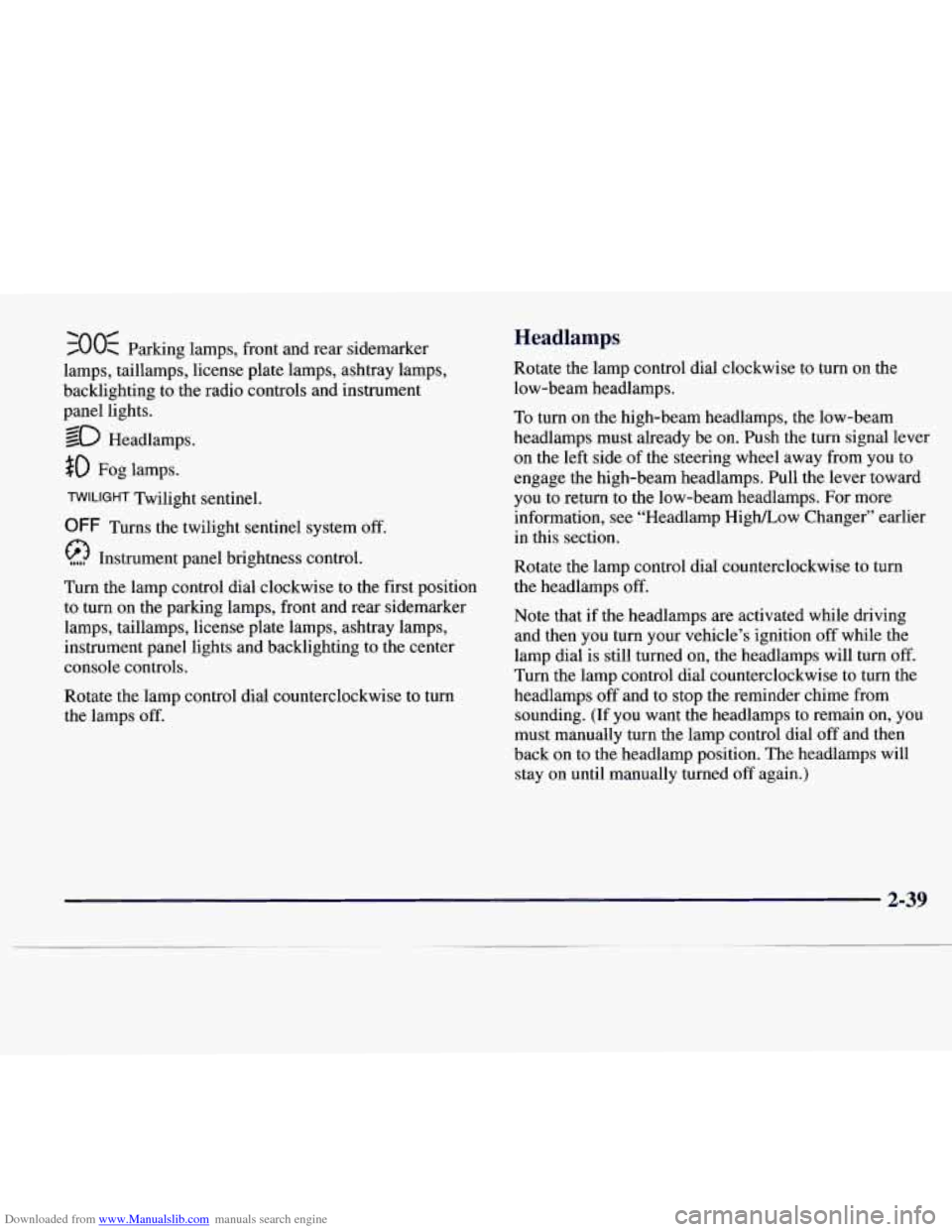
Downloaded from www.Manualslib.com manuals search engine -4
700< Parking lamps, front and rear sidemarker
lamps, taillamps, license plate lamps, ashtray lamps,
backlighting to the radio controls and instrument
panel lights.
so Headlamps .
$0 Fog lamps.
TWILIGHT Twilight sentinel.
OFF Turns the twilight sentinel system off.
@ Instrument panel brightness control.
Turn the lamp control dial clockwise to the first position
to turn on the parking lamps, front and rear sidemarker
lamps, taillamps, license plate lamps, ashtray lamps,
instrument panel lights and backlighting to the center
console controls.
Rotate the lamp control dial counterclockwise to turn
the lamps
off.
Headlamps
Rotate the lamp control dial clockwise to turn on the
low-beam headlamps.
To turn on the high-beam headlamps, the low-beam
headlamps must already be on. Push the turn signal lever
on the left side of the steering wheel away from you to
engage the high-beam headlamps. Pull the lever toward you to return
to the low-beam headlamps. For more
information, see “Headlamp High/Low Changer” earlier
in this section.
Rotate the lamp control dial counterclockwise
to turn
the headlamps off.
Note that if the headlamps are activated while driving
and then you turn your vehicle’s ignition off while the
lamp dial is still turned on, the headlamps will turn
off.
Turn the lamp control dial counterclockwise to turn the
headlamps off and to stop the reminder chime from
sounding. (If you want the headlamps to remain on, you
must manually turn the lamp control dial off and then
back on to the headlamp position. The headlamps will
stay
on until manually turned off again.)
2-39
Page 105 of 338

Downloaded from www.Manualslib.com manuals search engine Light Sensor Interior Lamps
The light sensor for the twilight sentinel is located in the
center of the front defogger grille. If
you cover the
sensor, it will read “dark” and the parking lamps and
low-beam headlamps will come on.
Instrument Panel Brightness Control
This control dial is located to the right of the fog lamp
button.
As you rotate the control dial up, the instrument
panel lights will brighten.
Illuminated Entry
This system turns on the courtesy lamps (dome lamps
and door entry lamps) for about
20 seconds when any of
the following occur:
0 if you manually unlock your vehicle with the key,
if any door is opened or closed or
if you press the unlock button on the
RKE transmitter.
Illuminated entry immediately ends when your vehicle’s
ignition is turned to the RUN or START position.
2-44
Page 107 of 338
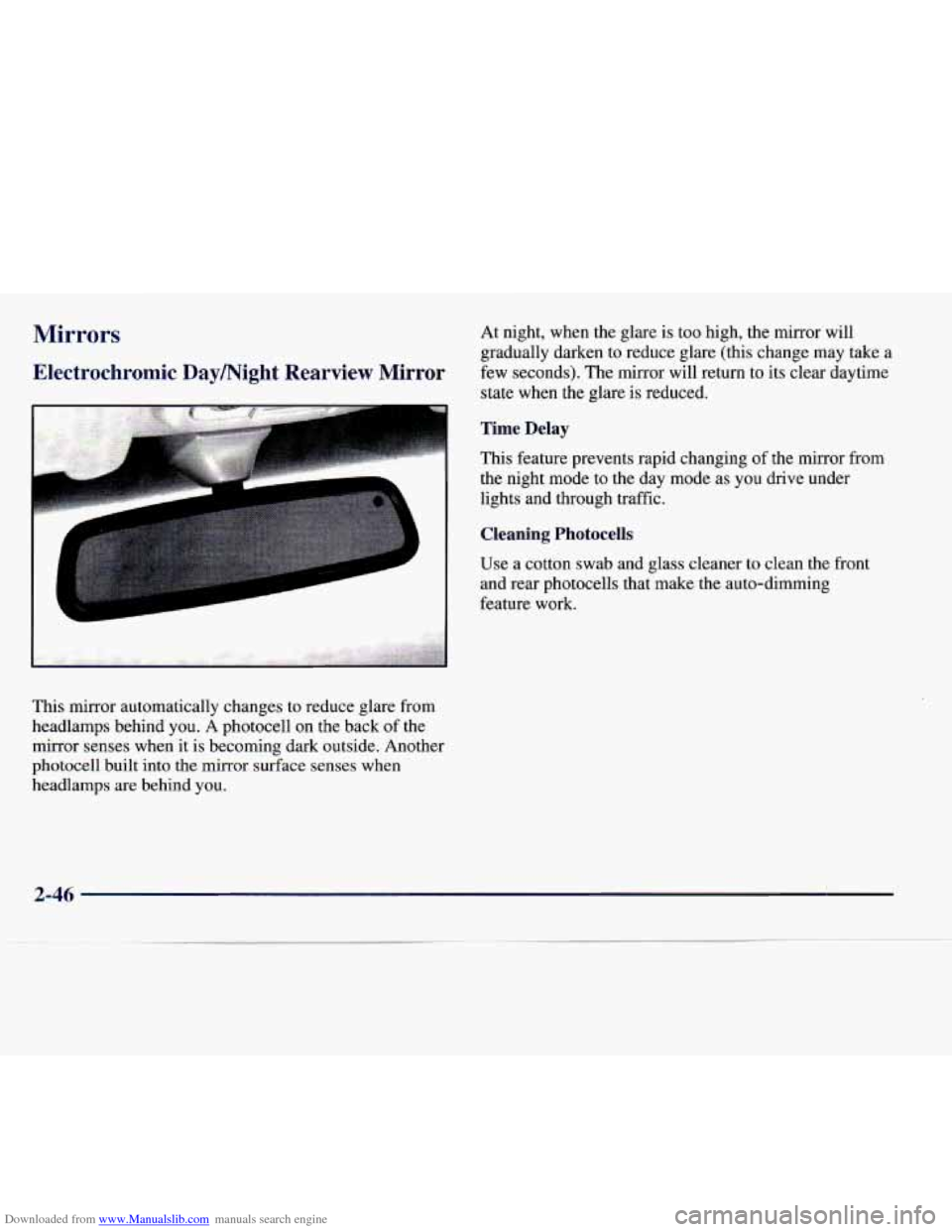
Downloaded from www.Manualslib.com manuals search engine Mirrors
Electrochromic Daymight Rearview Mirror
I
This mirror automatically changes to reduce glare from
headlamps behind you. A photocell
on the back of the
mirror senses when it is becoming dark outside. Another
photocell built into the mirror surface senses when
headlamps are behind you. At night, when the
glare is too high, the mirror will
gradually darken to reduce glare (this change may take a
few seconds). The mirror will return to its clear daytime
state when the glare is reduced.
Time Delay
This feature prevents rapid changing of the mirror from
the night mode to the day mode as you drive under
lights and through traffic.
Cleaning Photocells
Use a cotton swab and glass cleaner to clean the front
and rear photocells that make the auto-dimming
feature work.
2-46
Page 122 of 338
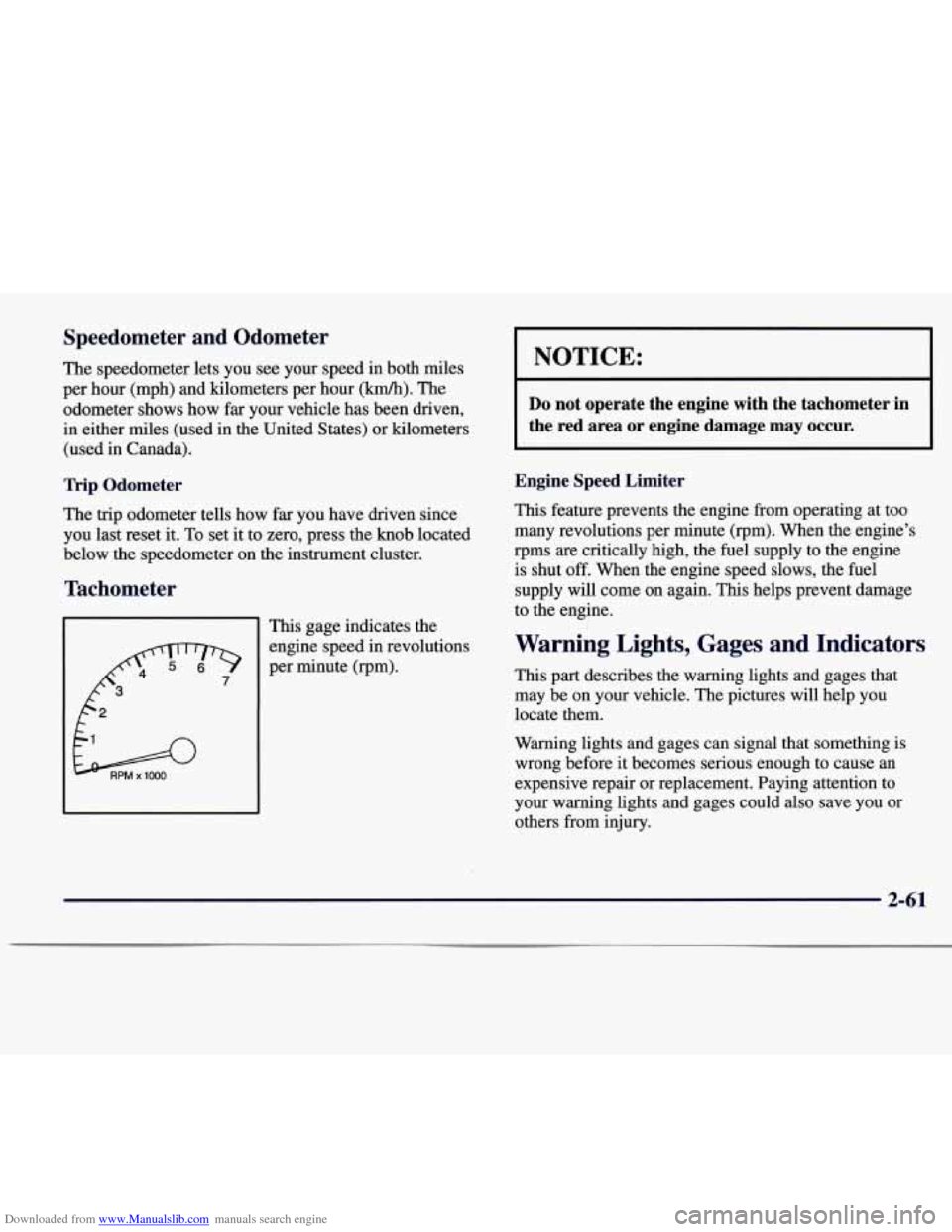
Downloaded from www.Manualslib.com manuals search engine Speedometer and Odometer
The speedometer lets you see your speed in both miles
per hour (mph) and kilometers per hour
(M). The
odometer shows how
far your vehicle has been driven,
in either miles (used in the United States) or kilometers
(used in Canada).
Trip Odometer
The trip odometer tells how far you have driven since
you last reset it. To set it to zero, press the knob located
below the speedometer on the instrument cluster.
Tachometer
This gage indicates the
engine speed in revolutions
per minute (rpm).
w RPM x 1000
NOTICE:
Do not operate the engine with the tachometer in
the red area or engine damage may occur.
Engine Speed Limiter
This feature prevents the engine from operating at too
many revolutions per minute (rpm). When the engine’s
rpms
are critically high, the fuel supply to the engine
is shut
off. When the engine speed slows, the fuel
supply will come on again.
This helps prevent damage
to the engine.
Warning Lights, Gages and Indicators
This part describes the warning lights and gages that
may be on your vehicle. The pictures will help you
locate them.
Warning lights and gages can signal that something is
wrong before it becomes serious enough to cause an
expensive repair or replacement. Paying attention to
your warning lights and gages could also save you or
others from injury.
2-61
Page 123 of 338
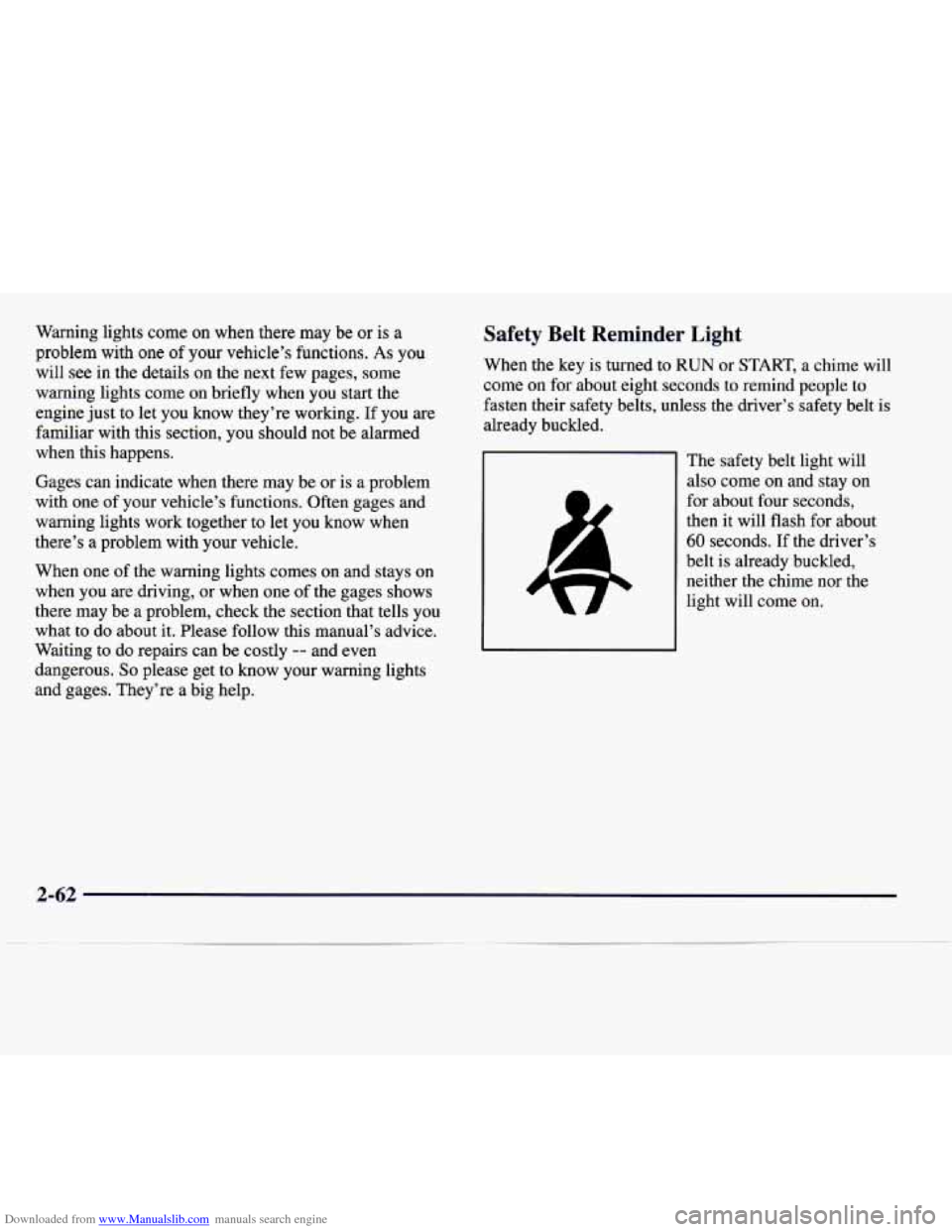
Downloaded from www.Manualslib.com manuals search engine Warning lights come on when there may be or is a
problem with one of your vehicle’s functions.
As you
will see in the details on the next few pages, some
warning lights come on briefly when you start the
engine just to let you know they’re working. If you are
familiar with this section, you should not be alarmed
when this happens.
Gages can indicate when there may be or is a problem
with one of your vehicle’s functions. Often gages and
warning lights work together to let you know when
there’s a problem with your vehicle.
When one of the warning lights comes on and stays on
when you are driving,
or when one of the gages shows
there may be a problem, check the section that tells you
what to
do about it. Please follow this manual’s advice.
Waiting to do repairs can be costly
-- and even
dangerous.
So please get to know your warning lights
and gages. They’re a big help.
Safety Belt Reminder Light
When the key is turned to RUN or START, a chime will
come on for about eight seconds to remind people to
fasten their safety belts, unless the driver’s safety belt is
already buckled.
The safety belt light will
also come on and stay on
for about four seconds,
then it will flash for about
60 seconds. If the driver’s
belt is already buckled,
neither the chime nor the
light will come
on.
2-62
Page 136 of 338
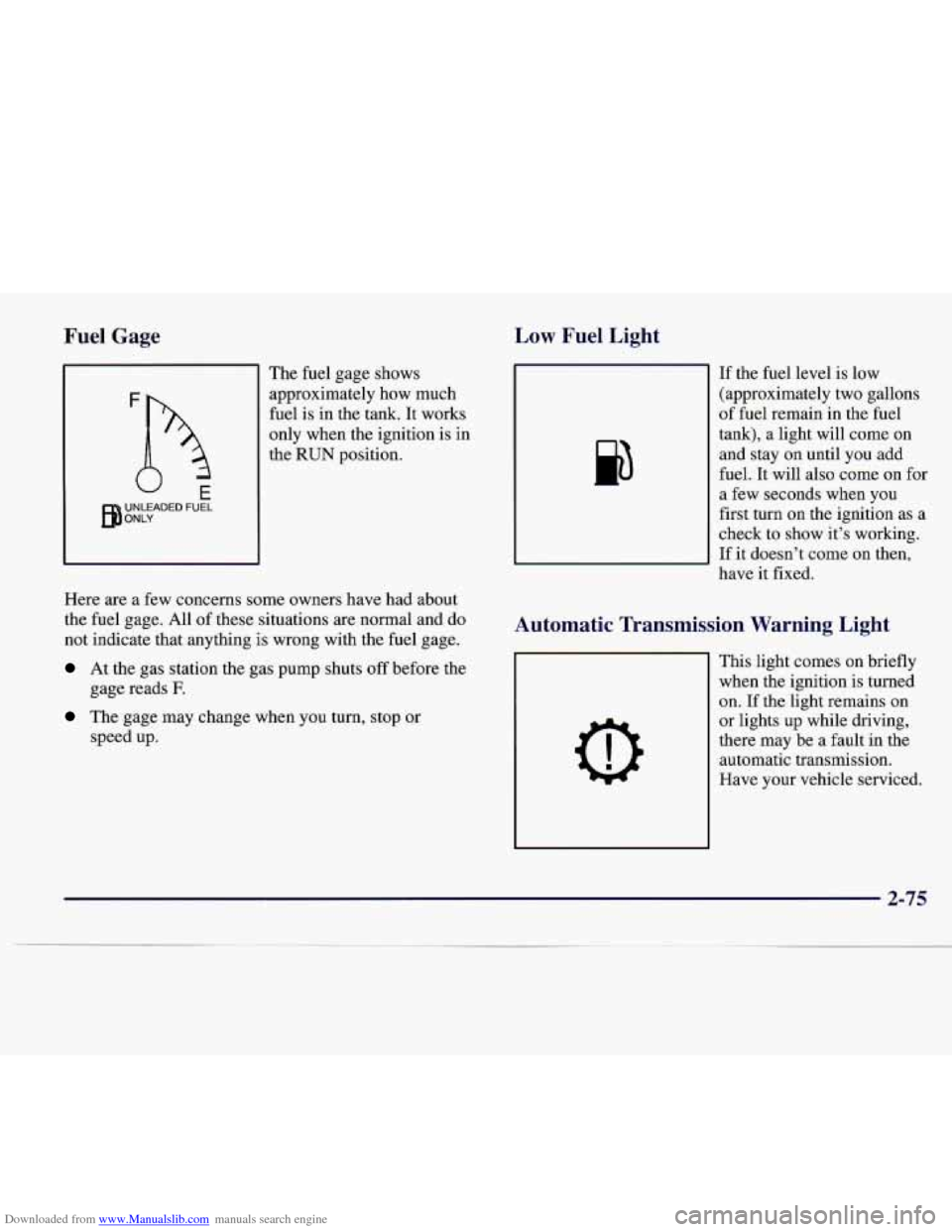
Downloaded from www.Manualslib.com manuals search engine Fuel Gage Low Fuel Light
The fuel
gage shows
approximately how much
fuel is in the tank. It works
only when the ignition is in
the
RUN position.
Rere
are a few concerns some owners have had about
the fuel gage. All of these situations are normal and do
not indicate that anything is wrong with the fuel gage.
At the gas station the gas pump shuts off before the
The gage may change when you turn, stop or
gage reads
E
speed
up. If
the
fuel level is low
(approximately
two gallons
of fuel remain in the fuel
tank),
a light will come on
and stay on until you add
fuel. It will also come on for
a few seconds when you
first turn
on the ignition as a
check to show it’s working.
If it doesn’t come on then,
have it fixed.
--
--nsmission Warning Light
0
This light comes on briefly
when the ignition is turned
on. If the light remains on
or lights up while driving,
there may be a fault in the
automatic transmission.
Have your vehicle serviced.
2-75
Page 184 of 338
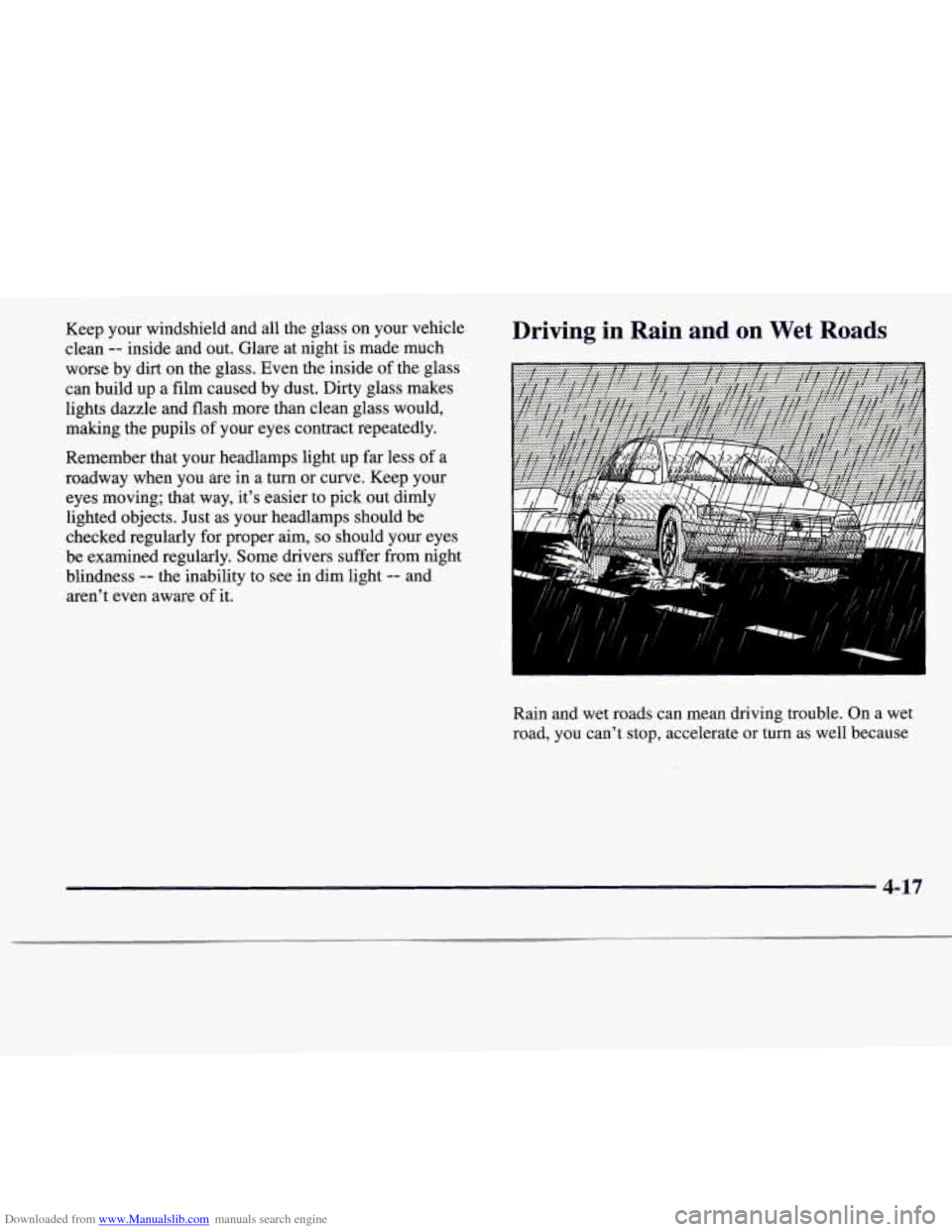
Downloaded from www.Manualslib.com manuals search engine Keep your windshield and all the glass on your vehicle
clean
-- inside and out. Glare at night is made much
worse by dirt on the glass. Even the inside
of the glass
can build up a film caused by dust. Dirty glass makes
lights dazzle and flash more than clean glass would,
making the pupils
of your eyes contract repeatedly.
Remember that your headlamps light up far less
of a
roadway when you are in a turn or curve. Keep your
eyes moving; that way, it's easier to pick out dimly
lighted objects. Just as your headlamps should be
checked regularly for proper aim,
so should your eyes
be examined regularly. Some drivers suffer from night
blindness
-- the inability to see in dim light -- and
aren't even aware
of it.
Driving in Rain and on Wet Roads
Rain and wet roads can mean driving trouble. On a wet
road, you can't stop, accelerate
or turn as well because
4-17
Page 263 of 338
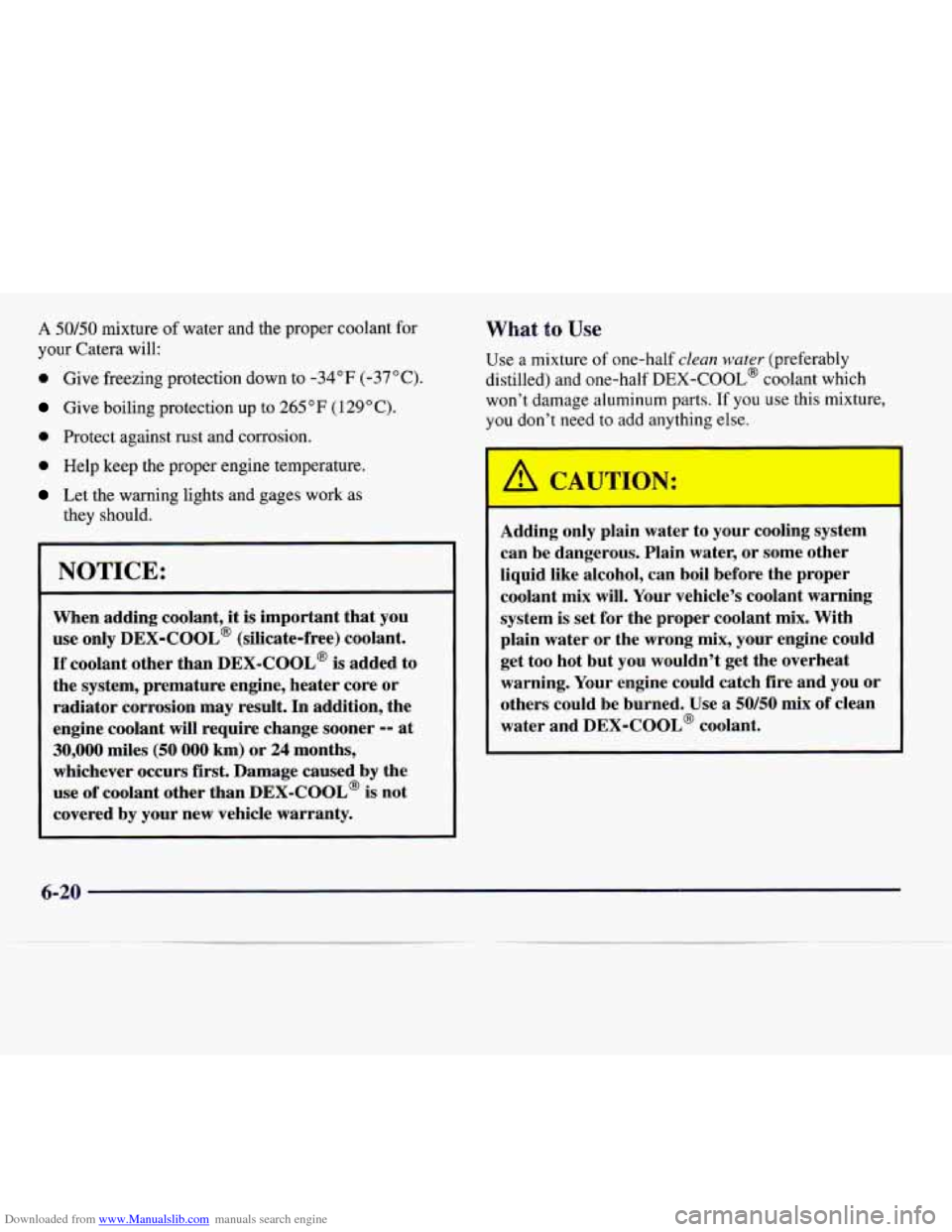
Downloaded from www.Manualslib.com manuals search engine A 50/50 mixture of water and the proper coolant for
your Catera will:
0 Give freezing protection down to -34°F (-37°C).
Give boiling protection up to 265 "F (1 29 " C).
0 Protect against rust and corrosion.
0 Help keep the proper engine temperature.
Let the warning lights and gages work as
they should.
NOTICE:
When adding coolant, it is important that you
use only
DEX-COOL@ (silicate-free) coolant.
If coolant other than DEX-COOL@ is added to
the system, premature engine, heater core or
radiator corrosion may result. In addition, the
engine coolant will require change sooner
-- at
30,000 miles (50 000 km) or 24 months,
whichever occurs first. Damage caused
by the
use of coolant other than DEX-COOL@ is not
covered by your new vehicle warranty.
What to Use
Use a mixture of one-half clean water (preferably
distilled) and one-half
DEX-COOL' coolant which
won't damage aluminum parts.
If you use this mixture,
you don't need to add anything else.
Adding only plain water to your cooling system
can be dangerous. Plain water, or some other
liquid like alcohol, can boil before the proper
coolant mix will. Your vehicle's coolant warning
system is set for the proper coolant mix. With
plain water or the wrong mix, your engine could
get too hot but you wouldn't get the overheat
warning. Your engine could catch fire and you or
others could be burned. Use
a 50/50 mix of clean
water and
DEX-COOL@ coolant.
6-20